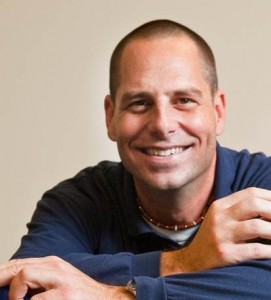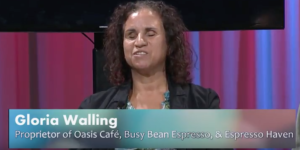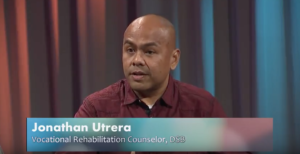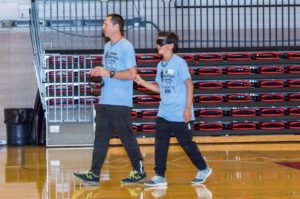Our diversity is what makes the human race so special. Each individual person is a unique sum of their past experiences, personal opinions/beliefs and their physical characteristics. No two of us are alike. Even twins, as they age and experience the world differently, are not the same person.
This diversity is also what makes companies grow and innovate. How many times have you heard the story where a company was unsure how to move forward and when they hired a new employee with fresh ideas, the company moved into its next phase? It happens all the time. For this reason, differences on a resume should be sought, whatever they mybe. This includes people with physical disabilities as well.

There are over 33,000 people in Thurston County that have a disability, according the latest American Community Survey. Sixteen percent of those individuals have incomes below the poverty level. Part of the challenge comes from finding businesses willing to hire an employee with a disability. But, just like people from any walk of life other than our own, these employees bring their own unique perspectives and skill sets that can be an asset to any workforce. A recent Thurston Community Media (TC Media) roundtable discussion showcased this through first-hand accounts.
Keith Edgerton, construction, sustainability and employee transportation coordinator at Providence St. Peter Hospital, is one of these first-hand accounts. 12 years ago, his degenerative eye condition progressed to the point where he has only about 17 degrees of peripheral vision, versus a “normal eye” which has 180 degree of vision. Edgerton says it’s like looking through milkshake straws. At that point, he was declared legally blind and could no longer drive. “It was probably the hardest thing I had ever experienced,” he shares. “It was something where I couldn’t envision how my life could work as a single parent and as a professional. How could I do that without driving?”
Fast forward to today, and Edgerton is not only surviving, but he is thriving. As the employee transportation coordinator at Providence, he gets to share with others how to live a life outside the car. “I have street cred because I haven’t driven in 12 years,” he says. This means he doesn’t take other people excuses about why they must drive. “I’m really proud about how I’ve been able to do it. There are times when it’s challenging, but for the most part it’s a wonderful experience. And now I get to share with other people how to have a life where they are not always driving.”

Gloria Walling is the owner of three coffee shops: Oasis Café, Busy Bean Espresso, and Espresso Haven. She is also totally blind. She works with the Washington State Department of Services for the Blind (DSB) helping employ, coach, mentor and intern people with disabilities so they can develop skills, look for work and eventually participate and contribute to society as well as take care of their families.
One of her employees has been with her since 2005. “She has become one of my most trusted, most valued, most dependable employees,” says Walling. “And she just wants to work, you know?” Walling says this particular employee does many tasks, from making coffee and espresso, to placing supply orders. “She is very immaculate and runs one of our cleanest facilities,” Walling adds.
Two people with disabilities have worked for her and gone on to be sole proprietors themselves. She helped them and used her own story as proof it was possible.
With technology such as talking registers and support networks, including the DSB, it’s easier than ever to help people with disabilities find meaningful work. “It may seem like a challenge at first, but it’s really not that hard to find something they can do,” she says.
People with Disabilities Myths

They can only do certain jobs. “But really with the appropriate tools and equipment, and the skills to use those items, they can pretty much do almost any job that’s out there,” says Jonathan Utrera, vocational rehabilitation counselor at DSB.
Employing someone with a disability is expensive. “If they were aware of the services and the support networks that were out there it would make things much easier,” Walling says. For example, she says the DSB came out and Brailled products and instructions, had job coaches come in and more.
Employer is responsible for those costs. Again, Walling says there are support networks that including financial aid for equipment and training.

A cane means a person is totally blind. Edgerton says that in reality, only 10-20 percent of visually impaired people are totally blind. Yet, he says people see his cane and treat him as if he was completely blind. “I am hoping we can dispel this myth,” he adds.
Given the chance, each person has the potential to be an incredible asset, not only to their job, but also to the Thurston County community.
To learn more about hiring people with disabilities and the resources available, watch the full Thurston Community Media Mission Non-Profit interview with host Andrea Capere and visit the Washington State Department of Services for the Blind website.



















































